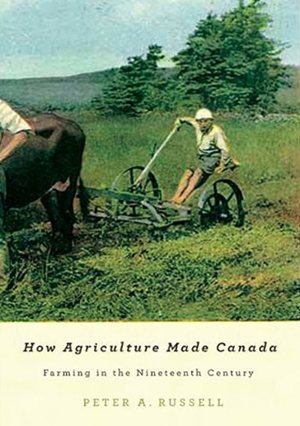How Agriculture Made Canada: Farming in the Nineteenth Century

Support Canada's History in other ways (more)
by Peter A. Russell
McGill-Queen’s University Press, Montreal, 2012 398 pp., $34.95 paperback
A double review with A History of the Prairie West, Volume 3: Agricultural History
edited by Gregory P. Marchildon
CPRC Press, Regina, 2011
426 pp., illus., $59.95 hardcover
Most Canadians today are a generation or two removed from farm life. Still, that doesn’t stop many of us from wondering where our food comes from — and maybe being curious about how grain came to dominate the Prairies, or about the challenges faced by Canada’s first farmers.
Agricultural History is a collection of essays that gives a good overview of the history of farming on the Prairies, from the First Nations farmers of the Red River region, who planted corn, beans, and squash, to the formation of large cattle-grazing lands in Alberta and the origins of the Canadian Wheat Board.
Interestingly, Aboriginals may have tilled the southern regions of the prairies fairly extensively until the outbreak of the Little Ice Age — a four-hundred-year cooling period that began in 1350 — made bison hunting more profitable. Other essays point out the laborious effort it took for later settlers to build their farms — none of which would have been possible without co-operative efforts, such as barn-building bees and the sharing of farm machinery.
Although academic in nature, this book is accessible to the general reader. It’s also well organized, nicely illustrated with archival photographs, and provides extensive footnotes.
How Agriculture Made Canada is not so much about farming per se as it is about nineteenth-century settlement patterns and language politics. The book analyzes how agricultural developments in Quebec and Ontario affected rural settlement in the Prairie provinces. When land ran out in Ontario, the province encouraged people to move west. Quebecers, however, were inclined to stay put or to migrate southward into the United States.
One consequence of the lack of francophone settlers was that Manitoba’s predominately French-speaking population was quickly overwhelmed by anglophones from Ontario.
Of course, historians differ on how to interpret the effects of the so-called land crises of the nineteenth century. Author Peter Russell reviews the historiographical debates and come ups with his own conclusions.
— Nelle Oosterom (Read bio)
Nelle Oosterom is the Senior Editor of Canada's History magazine.